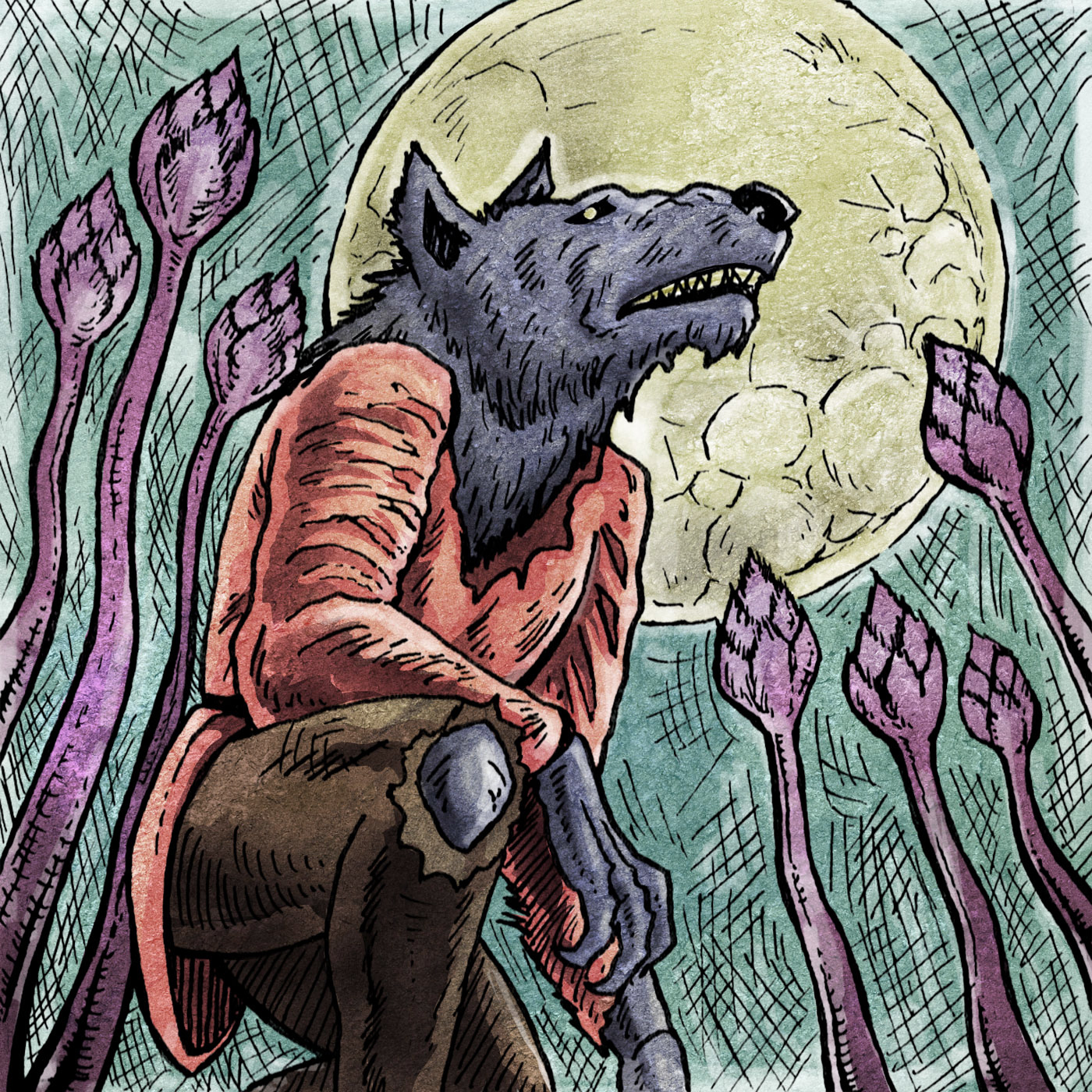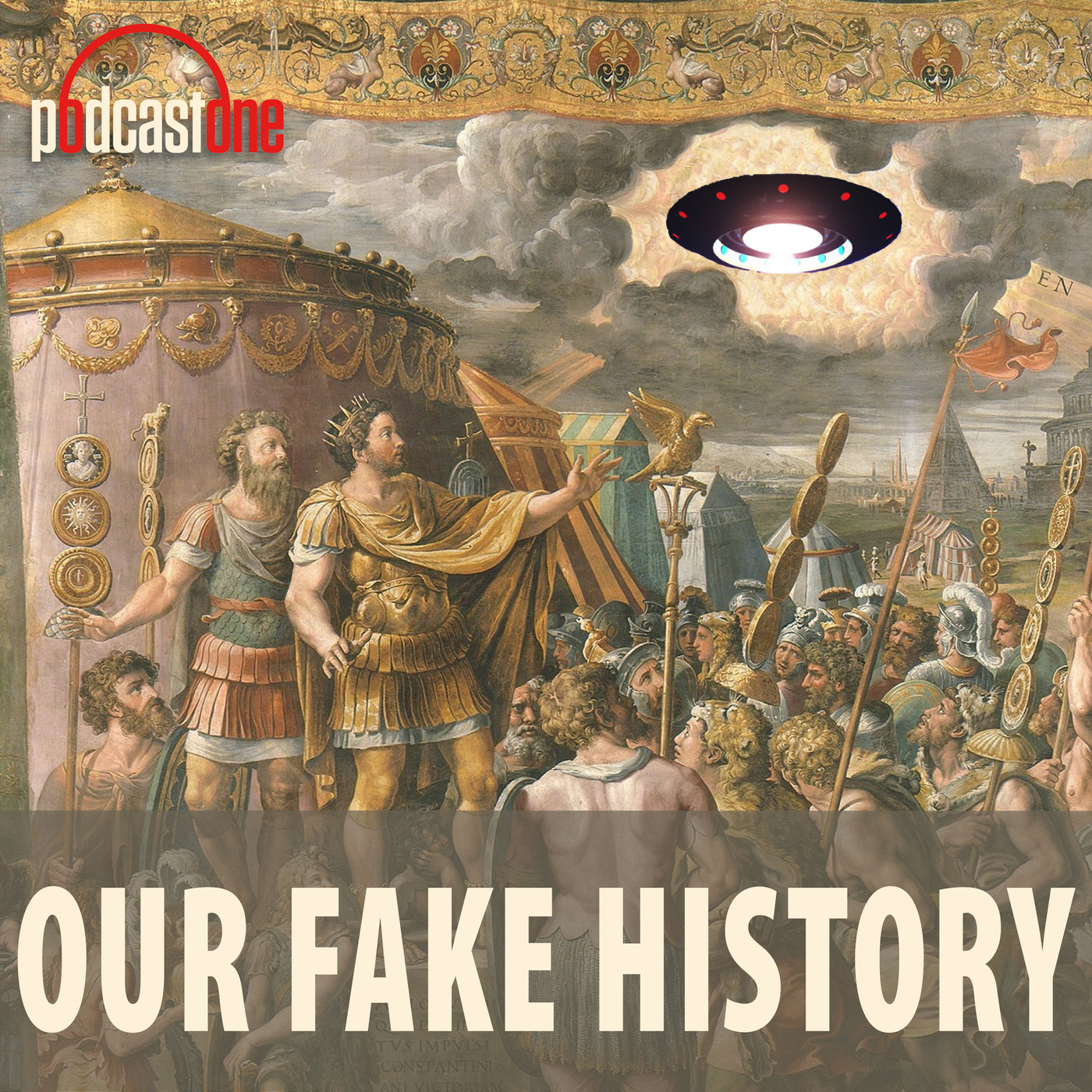Bonus Episode - Selkies, Spectacles, and Satire
In this Bonus Episode Sebastian takes questions about his recent exploration of mermaid mythology. He gets into the difference between Selkies and Mermaids, and wades into the murky waters of Scottish oral tradition. There is also some discussion of the 2012 hoax documentary Mermaids: The Body Found. Tune in and find out how aquatic apes, near sighted sailors, and good looking seals all play a role in the story.
F*%k your khakis and get The Perfect Jean
15% off with the code Fakehistory15 at theperfectjean.nyc/Fakehistory15 #theperfectjeanpod
See Privacy Policy at https://art19.com/privacy and California Privacy Notice at https://art19.com/privacy#do-not-sell-my-info.
Press play and read along
Transcript
Speaker 1
You're juggling a lot. Full-time job, side hustle, maybe a family.
And now you're thinking about grad school? That's not crazy. That's ambitious.
Speaker 1 At American Public University, we respect the hustle and we're built for it. Our flexible online master's programs are made for real life because big dreams deserve a real path.
Speaker 1
Learn more about APU's 40-plus career-relevant master's degrees and certificates at apu.apus.edu. APU built for the hustle.
You're juggling a lot.
Speaker 1
Full-time job, side hustle, maybe a family, and now you're thinking about grad school? That's not crazy. That's ambitious.
At American Public University, we respect the hustle and we're built for it.
Speaker 1 Our flexible online master's programs are made for real life because big dreams deserve a real path. Learn more about APU's 40-plus career-relevant master's degrees and certificates at apu.apus.edu.
Speaker 1 APU built for the hustle. hustle.
Speaker 2
Scottish selkies, speculative documentaries, and sailors in need of spectacles. All that and more on today's bonus episode of Our Fake History.
Hit the bonus theme.
Speaker 2 Hello, and welcome to this bonus episode of Our Fake History.
Speaker 2 My name is Sebastian Major, and normally this is the podcast where we look at historical myths and try to determine what's fact, what's fiction, and what is such a good story that it simply must be told.
Speaker 2 But on these bonus episodes, I like to respond to questions that have come in from the Patreon community and really anyone else who has sent me an email.
Speaker 2 I've just started putting out these bonus episodes in between larger series to get you some more Our Fake History goodness and to connect more with the listeners. I love hearing from you folks.
Speaker 2 Recently on episode number 229 of this podcast, Real Mermaids, we looked at mermaid mythology.
Speaker 2 I was particularly interested in that moment in the 17th and the 18th centuries when the European scientific community took the question of mermaids' existence quite seriously.
Speaker 2
But many of you listening were particularly interested in the story that I opened that episode with. Here's an email I got about it from a listener named Stuart Harrison.
Hi, Sebastian.
Speaker 2
I'm Stuart Harrison. I've been listening to your podcast since 2019 and have loved every episode.
Thanks, dude.
Speaker 2 When listening to your most recent podcast about mermaids, your opening story reminded me of something. Growing up, I heard the story of the Selkie from Scottish mythology.
Speaker 2 A local children's theater even did a staged version of it. The story was nearly identical to the story you told of the fishermen who stole the mermaid's scales.
Speaker 2 But instead of scales from the mermaid, it was the Selki's seal skin that they shed every full moon or night, depending on the storyteller.
Speaker 2 I was blown away by how similar they were down to hiding the skin in an outhouse.
Speaker 2 I'm sure you have encountered the Selki myth along with your research, and I see how it's different, turning between seal and person as opposed to being a half-seal, half-person.
Speaker 2
But found that interesting and wanted to share. Thanks so much for the awesome show.
I'm glad I finally had something to write in about. Indubitably yours, Stuart Harrison.
Speaker 2 Thank you so much for that nice email, Stuart. Well, it turns out that Stuart was not the only one that saw a lot of similarities between that mermaid story and the traditional mythology of the Selki.
Speaker 2 Many of you in the Patreon community also pointed out the similarities between that story and the classic Selkie myths.
Speaker 2 One listener on Blue Sky was actually a little annoyed that I presented that story as a mermaid story and not, more accurately, as a piece of Selkie lore.
Speaker 2 In fact, that listener said this, is Batman real? Here's a classic green arrow story to open it all up.
Speaker 2 Okay, okay, point taken. So this raises the question, is the story originally about a Selkie or a mermaid? Which came first?
Speaker 2 Well, first I should describe what a Selkie is, for those of you that don't know. Selkie mythology comes to us primarily from the north of Scotland, in particular the Orkney and Shetland Islands.
Speaker 2 But we also get Selkie stories from Ireland and Norway.
Speaker 2 The word Selkie apparently derives from the Old Scots word for seal, and the Selkies themselves often present as typical seals that roam the North Sea.
Speaker 2 What makes a Selki special is that they can take their hide off and transform into a beautiful woman or a very attractive man, as some of the stories say.
Speaker 2 If a person is bold enough to steal the discarded seal skin of a transformed Selki, that Selkie then falls into their thrall. They are forced to marry the person bold enough to steal the skin.
Speaker 2 So the similarities between that Selkie story and the story of the mermaid that I told at the top of the last episode are pretty obvious.
Speaker 2 What's difficult is trying to pin down which of the stories came first.
Speaker 2 The story that I told at the top of the last episode is known as the Keswick Mermaid, as it was collected from the Keswick fairy region in a part of Scotland known as Black Isle.
Speaker 2 I made this whole point about Black Isle being a peninsula, and you know, not quite an island, not quite the mainland, a hybrid. I thought I was being very clever with all of that.
Speaker 2 Now, I read that story in a book called The Penguin Book of Mermaids, which was an anthology of mermaid mythology that was curated by the experts Christina Bacalega and Marie Alohalani Brown.
Speaker 2 The source that they cite for that story is an earlier collection of Scottish mythology by Ronald MacDonald Robertson. Yes, Ronald MacDonald was behind the whole thing.
Speaker 2 Now, Ronald MacDonald Robertson claims that he got all of these stories from even earlier collections of oral storytelling collected from throughout Scotland.
Speaker 2 He himself went around and collected many of these stories himself. He published a huge collection of them originally in 1961, but many of the stories date back to at least 1908.
Speaker 2 Now, interestingly, in Ronald MacDonald Robertson's book, he makes a distinction between mermaid stories and selkie stories. Both types of stories appear in his folklore collection.
Speaker 2 And as you may have guessed, many of the mermaid stories sound like Selkie stories, and many of the Selkie stories sound like mermaid stories. What should we conclude from this?
Speaker 2 I would say that this means that there was this robust tradition of storytelling going on in Scotland.
Speaker 2 In some places, the mythical beast most often cited was the Selkie, whereas in other places it was the mermaid. But the story remained essentially the same.
Speaker 2 Now, trying to pin down which one came first might be impossible.
Speaker 2 As Ronald MacDonald Robertson warns in the introduction to his collection, the material for the legends has been derived mainly from oral sources.
Speaker 2 The reader is free to draw his own inferences from the tales.
Speaker 2 With regards to responsibility for their accuracy, the writer can only say, and then he quotes a Scottish phrase I dare not try to pronounce, but it translates as:
Speaker 2
If it be a lie as told by me, it was a lie as told to me. End quote.
I kind of like that. It just reminds us that oral traditions are messy.
Speaker 2 Now, I thought a lot about why that one user on Blue Sky was so annoyed by my opening mermaid tale.
Speaker 2 Perhaps she thought that I had taken something that was authentically Scottish or Irish, a selkie tale, and I had watered it down, made it more Anglo.
Speaker 2 It's not uncommon for very culturally specific stories to be taken out of their cultural context, watered down, and then presented to an audience that don't fully understand their original context.
Speaker 2 So I can understand why it might be frustrating to hear a story that you understood as a Selkie story presented as a mermaid story. It might feel like an outsider is trying to erase your heritage.
Speaker 2 That kind of thing does happen, so we should have our radar tuned to it. But I'm not sure that is what is happening in this particular case.
Speaker 2 If we trust both Ronald McDonald Robertson and the editors of the Penguin Book of Mermaids, then it seems like these mermaid traditions and Selkie traditions existed alongside one another.
Speaker 2
So if you are annoyed that a selky story was presented as a mermaid story, please do not blame me. Blame those Scottish fishermen.
If it be a lie as told by me, it was a lie as told to me.
Speaker 2
Next up, we have a question from the Patreon community. This one comes from Jennifer.
Jennifer asks, just finished the real mermaids episode. So interesting, loved it.
Speaker 2 While listening to the episode, I had had a thought. How good was the eyesight of the sailors? I think I read a stat that about 70% of American adults need corrective lenses.
Speaker 2 I imagine that even if corrective lenses were around during this time period, they were likely only available to the wealthy.
Speaker 2 If that's the case, then I think it's easy to see how these sailors could mistake a dugong or other marine life for a mermaid.
Speaker 2 To add to that, they likely would have heard stories from other sailors about seeing mermaids at sea, so their imaginations would be primed to see just that.
Speaker 2 Curious about your thoughts. Thanks for the great question, Jennifer.
Speaker 2 Your question actually connects nicely to a comment from another patron user, John Blood, who I see commenting on stuff all the time on Patreon.
Speaker 2 John says, I disagree with the assertion that all these sailors saw something they thought were mermaids. Surely some of them were were lying.
Speaker 2 These guys made stuff up to impress land lobbers, especially Columbus. They lied.
Speaker 2 All right, thanks, John. So I think both Jennifer and John were responding to something that I was implying in the last episode.
Speaker 2 I made the case that sailors were seeing something that was real that they misinterpreted as a mythical creature.
Speaker 2 I agree with what Jennifer said, that these guys were primed to see something strange while at sea.
Speaker 2 This was because of all the cultural representations of mermaids around them and because of those stories that they would have been told by other sailors.
Speaker 2 But perhaps I did not consider the two points that Jennifer and John bring up here. One, Maybe people could not see as well on average in the 1600s and and 1700s.
Speaker 2
I had not considered that as a factor. That's a good point.
Most people do not have perfect vision, and back then, fewer people would have been wearing glasses or any other type of corrective lenses.
Speaker 2 I would add that bad vision perhaps gives your imagination more space to fill in the blanks. So that's an interesting point.
Speaker 2 I had not considered the role that people's inability to see things that that are far away may have played in the mermaid sightings.
Speaker 2 John also makes a good point that people lie.
Speaker 2
Yes, people lie. We should not forget that when we are reading historical sources.
Lying occurs all the time.
Speaker 2 I have no doubt that many mermaid stories were in fact tall tales meant to entertain folks at the pub.
Speaker 2 What I found really interesting were those stories that were presented with a certain scientific precision and then were backed up by other witnesses in a sort of legalistic way.
Speaker 2 The people that wrote those accounts obviously did not want to be accused of lying.
Speaker 2 That's why they made such a big point of saying that their witnesses were learned men of medicine or lawyers or ship's captains, respected people who could be trusted.
Speaker 2 In those cases, I am more inclined to believe that those people saw something.
Speaker 2 Now, it's my personal belief that what they saw was likely a more mundane sea creature, a dugong, a mermaid, a seal, a dolphin. But I don't think they entirely made up the encounter.
Speaker 2
For instance, there's the tale of the mermaid in St. John's Harbor in Newfoundland.
That mermaid sounds a lot like a big seal to me.
Speaker 2 Now, I cannot prove this, but there's something about that account that makes that being sound like a seal.
Speaker 2 I think it's the part where he talks about the mermaid trying to get into a rowboat and then being smacked on the head by an oar.
Speaker 2 I have seen sea lions awkwardly try and get their fins into a boat, and it can be kind of frightening and weird and clumsy.
Speaker 2
That moment really reminded me of times in my own life where I've seen sea lions do things like that. So I cannot prove that the St.
John's Newfoundland mermaid was actually a seal.
Speaker 2 And all of these learned men swore that it was not a seal at all, but in fact, a mermaid. So who knows? But
Speaker 2 if I was to guess, I would say that was probably a big seal that was misidentified.
Speaker 2 But all of this is to say, yes, we should not discount bad eyesight and straight up lying clouding the historical record. Those things certainly do factor in.
Speaker 3 You want your master's degree.
Speaker 2 You know you can earn it, but life gets busy.
Speaker 3 The packed schedule, the late nights, and then there's the unexpected. American Public University was built for all of it.
Speaker 3 With monthly starts and no set login times, APU's 40-plus flexible online master's programs are designed to move at the speed of life. Start your master's journey today at apu.apus.edu.
Speaker 2 You want it?
Speaker 3 Come get it at APU.
Speaker 2
The next question comes to us from Addison on Patreon. Addison writes, Hi, Sebastian.
Sorry for the long message, but I was so excited when the topic of this episode was released.
Speaker 2 I grew up with mermaid stories and especially love playing make-believe with my friends and arguing about what all of our mermaid powers and tale colors would be. If you know your own, please share.
Speaker 2 A particular mermaid piece of media I remember is the Discovery Channel's Mermaids, the Body Found.
Speaker 2 This was a speculative documentary that focused on mysterious underwater recordings of a body found underwater, which scientists, that's in quotes, they were paid actors, used to present the aquatic ape hypothesis.
Speaker 2 My question is this, how do fictional broadcasts like these distort our perceptions of folklore? Thanks.
Speaker 2 Thanks for that question, Addison. What would my mermaid tail color be? Oh, I don't know.
Speaker 2 I feel like each color would come with its own set of magical mermaid powers, so I would want to choose that very wisely. Actually, my daughter has just gotten into watching this mermaid show.
Speaker 2
So I bet she would have a good answer for that one. I'll ask her about that later.
But I really appreciate your question about mermaids, the body found.
Speaker 2 You were actually not the only listener that reached out to me about that particular hoax. Now, I should say, as a point of clarification, it originally aired on Animal Planet, not Discovery.
Speaker 2 I'm not sure if Animal Planet falls under the wider umbrella of Discovery, but it was on Animal Planet, so says my research.
Speaker 2 Now, for those that don't know, this was a program that presented itself as a legitimate documentary that aired on Animal Planet in 2012.
Speaker 2 In the television broadcast, a group of actors portraying scientists from the National Oceanic and Atmospheric Administration claimed that they had proved the existence of a remnant population of mermaids still living in the ocean.
Speaker 2 But just before the blockbuster piece of evidence, a body of one of these mermaids was to be shown, the American government swooped in and covered the whole thing up.
Speaker 2 They don't want you to know about the mermaids, you see.
Speaker 2 Now, the whole thing so effectively mimicked the beats of a real documentary that many people thought it was legit.
Speaker 2 There was a tiny disclaimer that was aired near the end of the documentary right before the final credits rolled, but many people did not see it or didn't read it and were left convinced that mermaids were real and that the government had tried to cover the whole thing up.
Speaker 2 The reality of this was buttressed by a real anthropologic theory known as the aquatic ape hypothesis.
Speaker 2 This was a theory that was originally proposed by the marine biologist Alan Hardy, who in the 1960s suggested that it was possible that human beings had a marine phase to our development.
Speaker 2 The hypothesis suggests that a group of early human ancestors, be they early Homo sapiens or some other early hominids, started living close to water and were were eating more and more fish and other seafood.
Speaker 2 This group of early human ancestors then started to adapt to better live in and around the water.
Speaker 2 Then, at another point in human evolution, these aquatic apes came back onto land and interbred with the mainstream of the humanoid population.
Speaker 2
This hypothesis helped explain why human beings were such better swimmers than other great apes. Chimpanzees, gorillas, orangutans, they don't really swim.
They have been seen swimming, by the way.
Speaker 2 There is some evidence that they can swim and have swum, but human beings are far more natural in the water. Now, in the decades since the 1960s, the aquatic ape hypothesis has not fared well.
Speaker 2 It doesn't seem to be very well supported in the fossil record. As such, most biologists and anthropologists reject it.
Speaker 2 So the long and short of it is that the aquatic ape hypothesis was one of those really cool ideas that makes for like a fun national geographic article in 1965, but has since been largely set aside by the scientific community.
Speaker 2
It wasn't that it was totally fringe in its day. It just has not been properly backed up by the best evidence.
So most experts have let it go.
Speaker 2 But if it's your first time hearing about the aquatic ape hypothesis, you might find it very compelling.
Speaker 2 I know that the first time I heard about the aquatic ape hypothesis, I found it very compelling.
Speaker 2 I was particularly interested in the idea that human brains may have started growing bigger once we started eating more fish. The omega-3s really encouraged brain growth.
Speaker 2 But unfortunately, the evidence simply has not borne out this hypothesis.
Speaker 2 But you might remember from my episode on Edgar Allan Poe and his scientific hoaxes, this is how scientific hoaxes work.
Speaker 2 Part of the scam is to use real science, or something that has the appearance of real science, to give the thing a sense of legitimacy.
Speaker 2 In this case, case, a discounted 1960s biological theory is just the ticket.
Speaker 2 But to answer your question, yes, not only do broadcasts like this distort our understanding of folklore, they also distort our understanding of science.
Speaker 2 The fact that this was fiction was not made obvious enough at the outset. And Animal Planet benefited from that because they got amazing ratings for that particular documentary.
Speaker 2 It was watched more than any other documentary that they put out in 2012.
Speaker 2 The writer Brian Swittick wrote an excellent criticism of Mermaids the Body Found back in 2012 on the website for Wired magazine.
Speaker 2 He really eloquently sums up the big problem with this faux documentary. So I'm going to quote his piece at length here.
Speaker 2 Swittick writes, quote, speculative biology can be a lot of fun to wonder how different forms of life might have evolved.
Speaker 2 And with the right context and presentation, mermaids could have been a unique way to highlight evolutionary and biological ideas.
Speaker 2 But rather than being a hook for communicating actual science, mermaids was a sensationalistic end in itself.
Speaker 2 The show was meant to titillate and deceive yet another bit of noxious rot in what I have often called television's bottomless chum bucket.
Speaker 2 I'm sure Animal Planet would defend itself by saying that it issued a disclaimer, but clearly viewers either tuned out or just didn't pay attention.
Speaker 2 When a science fiction show dressed up as a documentary presents the dramatic reenactment caveat at the bottom of some scenes, it's not surprising that some viewers were confused about what they were actually seeing.
Speaker 2 Not that my debunking will do much good. I don't know how many people watched Mermaids, but I'm certain that many more people saw it than will ever read this post.
Speaker 2 That's one of the most frustrating aspects of science communication. Misinformation spreads wide and fast, whether it's coming from a fake documentary or a news report.
Speaker 2
Debunking false claims only makes a difference if people actually pay attention to the correction. End quote.
Whoa.
Speaker 2
Brian Swittek wrote that in 2012. If he only knew what was coming.
I could not agree more that the process of debunking false claims is incredibly difficult.
Speaker 2 In the 13 years since he wrote that, it's only gotten worse. I'm sure I don't need to tell you.
Speaker 2 Now, one of the reasons I love history is that a close reading of the historical record record can sometimes help you see through a lot of this nonsense.
Speaker 2 In the most recent episode on mermaids, I tried to show you how the mermaid evolved in people's imagination. Our idea of the modern mermaid didn't really come into being until the Middle Ages.
Speaker 2 It had to get there by combining different elements of folkloric tales until it finally came into the spot that we understand today.
Speaker 2 Now, I know that most people didn't need convincing that mermaids were not real, but that process of seeing how something evolved, be it an idea or the concept of a creature or anything like that, I feel like that helps us pick it apart.
Speaker 2 It makes us immune to its magic. So I guess I'm saying, Hooray for history, hooray for being analytical, boo for mermaids the body found.
Speaker 2 You were being sneaky and tried to profit off of people's gullibility. Shame on you, Animal Planet, for a thing you did 13 years ago.
Speaker 2 Okay, I think we've got time for one more question this week. This one also comes from Patreon from the user HumansWord.
Speaker 2 They ask, Hey, Sebastian, been a long time fan and lover of history.
Speaker 2 Since you've done episodes on Pocahontas and John Smith, the the possible basis of Mulan, and even the search for real mermaids, would there be a possibility of any other episodes around the historical basis/slash interesting points in history around various stories that have been made into Disney classics?
Speaker 2
Thanks for the question, humans word. The short answer is yes, totally.
Totally, I'll be doing more episodes on those types of things because
Speaker 2 many of the Disney classics are based on classic fairy tales. More than once on this show, I have asked the question, is this classic fairy tale based on some kernel of historical truth?
Speaker 2 Now, one incredibly rich source for folktales that I have not even touched is the 1001 Nights of Sheherazad, the collection of stories sometimes called the Arabian Nights.
Speaker 2 The story of Aladdin and his lamp comes from that particular collection, as does the story of Alibaba and the 40 Thieves and all sorts of other classics.
Speaker 2 For that matter, I've never done a proper deep dive on the Grimm Brothers and their original collection of fairy tales.
Speaker 2 So many of those original Disney classics are from Grimm's collection, so I could easily get myself deeper into the world of the Grimms.
Speaker 2 The Lion King is said to be a loose adaptation of Hamlet, So I suppose there's a whole vein to be mind on adaptations of Shakespeare or maybe Shakespeare as historian.
Speaker 2 Shakespeare himself wrote all these history plays. I've thought a lot about examining how he presents all these historical figures, but now I've gone on a bit of a tangent there.
Speaker 2
That takes us away from the Disney of it all. Long story short, totally.
Disney pulls from humanity's well of folk stories, and I do too on this podcast. So there is going to be some overlap for sure.
Speaker 2 So you can look forward to more episodes on things like that.
Speaker 2 Okay,
Speaker 2
that's all for this week's bonus episode. Thanks again to everyone who wrote in.
Thank you, thank you, thank you to my patrons.
Speaker 2 I love the vibrant discussion that's going on in the Patreon chat section.
Speaker 2 If you want to be a patron, go to patreon.com/slash our fake history and sign up at a level that works for you.
Speaker 2 Patrons at all levels get access to the chat, and patrons at all levels also get access to the brand new extra episode on the Bronze Age collapse. It is two hours of Bronze Age goodness.
Speaker 2 But I will answer questions from any listener out there, Patreon or no. So if you want to get in touch with me, please send me an email at ourfakehistory at gmail.com.
Speaker 2
Reach out to me on Blue Sky at Ourfake History. Reach out to me on Instagram at Ourfake History.
Find me on Facebook, facebook.com slash our fake history. Look for me on TikTok and find me on YouTube.
Speaker 2 As always, the theme music for this show comes to us from Dirty Church. Find more from Dirty Church at dirtychurch.bandcamp.com.
Speaker 2
All the other music you heard on the show today was written and recorded by me. My name is Sebastian Major.
And remember, just because it didn't happen doesn't mean it isn't real.
Speaker 4 Part of the James Altiser Show and bring on some of the most brilliant minds in every area of life. People like Richard Branson, Sarah Blakely, Mark Cuban, Danica Patrick, Gary Kasproth.
Speaker 4 And I wanted to find out exactly how they've navigated the highs, the lows, and everything in between. No fluff, just raw stories and real advice.
Speaker 4 I've talked to 1,500 of the most amazing people on the planet.
Speaker 4 So if you want to learn from the best and skip the same old canned interviews, we're all about helping you find your next big idea, level up your thinking, and ultimately to choose yourself.
Speaker 4 So let's do this together. Subscribe now to the James Altiter Show.





